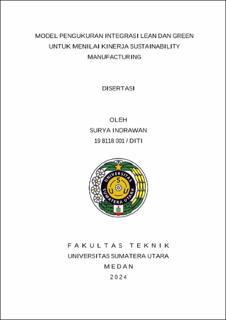| dc.description.abstract | The development of the Manufacturing industry is accelerating so that there are many challenges including scarcity of natural resources, increasingly strict regulations and global warming so it is necessary to adopt sustainable Manufacturing to improve company performance. For this reason, it is necessary to evaluate to improve company performance by assessing company performance. Many previous studies have assessed sustainability performance by integrating lean and Green in assessing sustainability performance from an economic, environmental and social perspective.
Where lean focuses on continuous improvement by eliminating waste, increasing value added and providing value to customers, while Green focuses on reducing or minimizing the impact on the environment and maximizing resource efficiency. Therefore, it is necessary to integrate both lean and Green to achieve sustainability.
Previous research in integrating lean and Green for sustainability performance assessment uses lean indicators and Green indicators to improve sustainability performance. However, in integrating these indicators, there are still relatively limited indicators used in assessing sustainability. In addition, the methods developed so far are still not comprehensive. For this reason, the purpose of this research is to develop a sustainability performance assessment model that is seen from the economic, environmental and social dimensions. The sustainability assessment developed in this research is a holistic assessment which focuses on Manufacturing activities.
The model developed by integrating lean indicators and Green indicators to assess sustainability in Manufacturing activities. Where the indicators are selected with the Delphi method approach to determine indicators and weighted with AHP, then visualized with value stream mapping (VSM) to see which indicators need to be improved or improved. The model developed not only identifies which lean and Green indicators to improve but this research provides suggestions for improvement by taking an approach using FMEA (Failure Mode and Effect Analysis) to identify which processes and indicators need to be improved and the last stage is a TOPSIS (Technique for Order by Similarity to Ideal Solution) approach for decision making on alternative solutions that are prioritized. This measurement model for assessing sustainability performance is comprehensive in the Manufacturing scope, where the indicators used are complementary to previous research models in assessing sustainability performance.
The contribution of this research is very helpful for academics and practitioners in making decisions to assess sustainability performance, especially in the case study of model testing, namely in the Manufacturing industry of the CPO (Crude Palm Oil) process into olein or cooking oil. Decision makers will be able to see which indicators and areas need to be improved and enhanced. | en_US |


